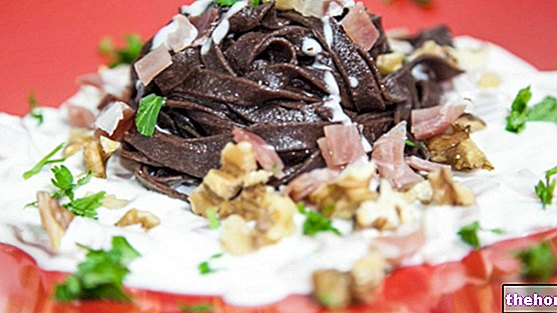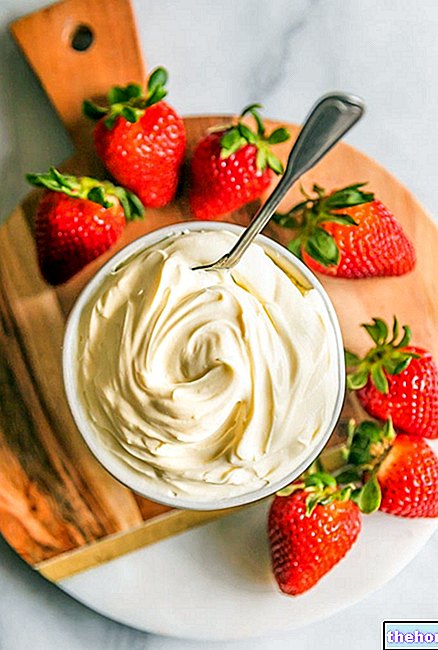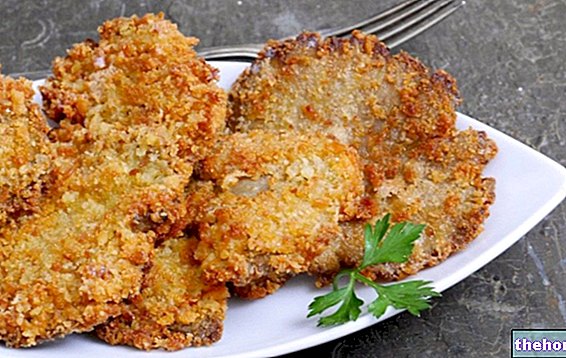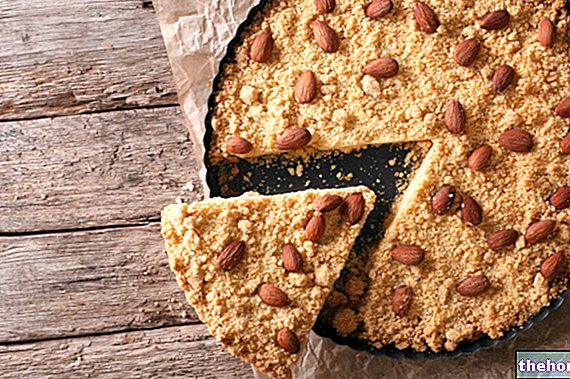Today we will give an answer to a recurring question: "is there one or more plant alternatives to animal eggs"?
To answer this, it is good to understand why eggs are used in cooking:
- For their emulsifying and binding capacities, able to amalgamate and keep the ingredients together (just think of mayonnaise, custard or meatballs)
- To give color in the preparation of sauces, creams, doughs and biscuits (e.g. glossy surface of quiches made from puff pastry)
- To inflate dough (physical leavening)
- For making breading (e.g. mozzarella in carrozza)
Before choosing the vegetable alternative to chicken eggs, it is therefore important to understand what our dough requires! Based on the different characteristics of the recipe, let's see which are the best known vegetable substitutions for eggs for making desserts, to give color to doughs, for making meatballs and savory recipes, for breading and for making dough swell.
Video of the Recipe
Problems with playing the video? Reload the video from youtube.
Identity Card of the Recipe
-
Materials Needed
-Preparation
Alternatives to eggs in desserts:
- Flax seeds soaked in water: 3 tablespoons of water mixed with 1 tablespoon of finely ground flax seeds form a gelatinous mass suitable for cookies, pancakes and muffins.
- Apple puree or grated (eg vegan apple pie): due to the presence of pectin (known soluble fiber), apple is a valid vegetable alternative to eggs because added to the dough it is able to form a jelly-like and compact mass.
- Soy yogurt (e.g. banana plumcake)
- Bananas (e.g. plum cake banana)
Alternatives to eggs for coloring creams and sauces or for polishing surfaces:
- Solution composed of vegetable milk + Saffron (e.g. vegan custard)
- Solution composed of vegetable milk + Turmeric (e.g. fake carbonara)
Alternatives to eggs in meatballs and savory preparations:
- Oat okara and soy okara (e.g. vegan soy meatballs). Okara is a "waste product" that remains after extracting the liquid (milk) from seeds or legumes: it is a fiber-rich compound capable of forming a dense mass and keeping the ingredients present in the dough bound.
- Mashed potatoes: the presence of starch in boiled potatoes - which acts as a natural glue - guarantees an extraordinary softness to the mixture into which it is added and facilitates the dough.
- Boiled rice: also in this case, rice boiled in water (doses: 1 part of rice in 2 parts of water) is considered an excellent replacement for eggs due to the presence of starch which, when mixed with other ingredients, forms a gelatinous mass. which binds them perfectly.
- Velvety tofu (in equal weight with the egg): 60 g of tofu are used as an alternative to an egg
- Vegetable Ricotta (in equal weight with egg): 60 g of vegetable ricotta is used as an alternative to an egg
- Boiled legumes: chickpeas (eg chickpea burgers), lentils (eg lentil meatloaf). In this case, the fiber and carbohydrates present in legumes facilitate the mixing of the ingredients.
- Water + starches (starch, tapioca, corn starch). A mixture based on water and any starch, brought to a boil, will form a sticky and dense batter (eg vegetable béchamel).
Egg alternatives for breading:
- Water and flour batter in a 3: 2 ratio (dyed with vegetable dye): the product will then be dipped in the batter and baked or fried
- Corn flakes (eg vegan cutlets): the food is rolled into crumbled corn flakes and then baked or fried.
Alternatives to eggs for "leavening" (To make the cake soft and porous):
- Solution consisting of apple cider vinegar or lemon juice and soy milk (ratio 1:10): soy milk, in contact with the acetic acid present in the vinegar or the citric acid contained in the lemon juice, coagulates. The curd obtained can be used to make the mixture softer.
- Mixture consisting of 1 tablespoon of apple cider vinegar + 1 pinch of baking powder (or cream of tartar): this mixture combined with other ingredients (eg flour, dried fruit, sugar, vegetable milk) favors chemical leavening, making the final product very soft.
- Mixture consisting of powdered soy milk + water: mixing 40 g of powdered soy milk with 20 ml of water you get a compound that is equivalent to an egg. It is used to mix the ingredients into a dough and to make them softer.
There are other valid plant replacements for eggs. Eg:
- It is possible to create a stable emulsion consisting of 2 parts of oil and one part of soy milk: in this case, you can create a compound that is very reminiscent of mayonnaise (vegan mayonnaise).
- As an alternative to egg-based omelette, you can make a dough made from chickpea flour and water (veg-omelette).
- There are also some natural substances (Agar agar) able to gel liquids. They are used for the preparation of creams and puddings (eg vegan coffee pudding).
Alice's comment - PersonalCooker
Now that we have discovered many vegetable alternatives to eggs, we just have to carefully choose the type of substitution that best suits our vegetable recipe, with an eye to the consistency to obtain a surprising and always cruelty-free result.Nutritional values and Health Comment on the recipe




























